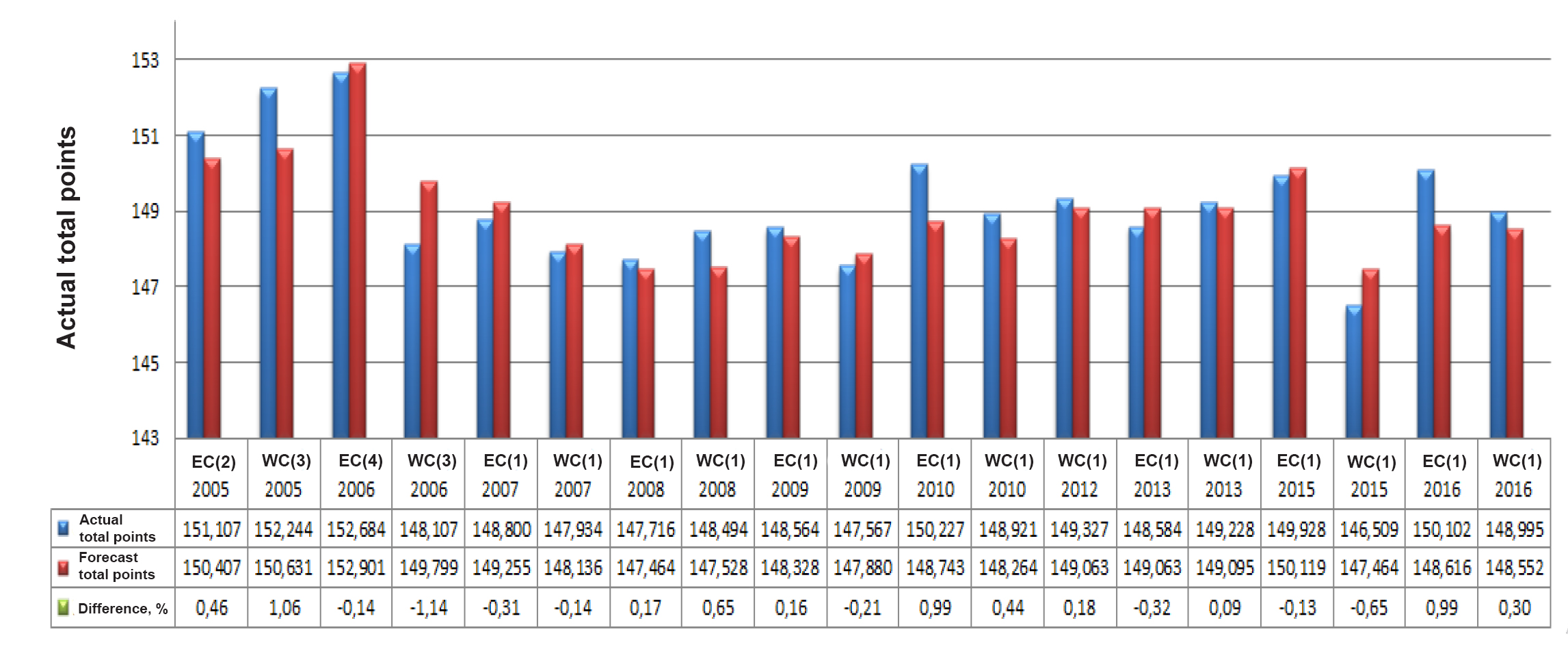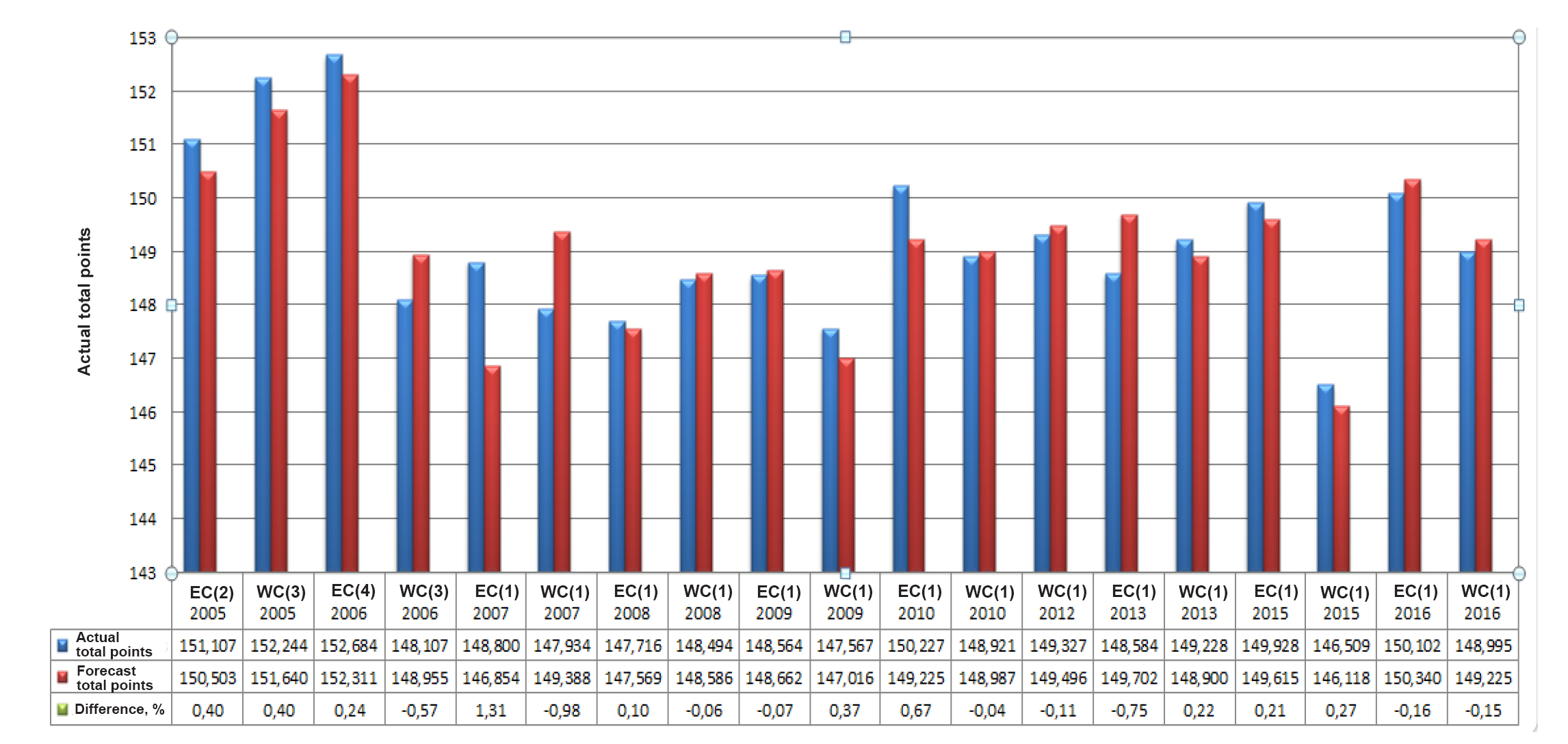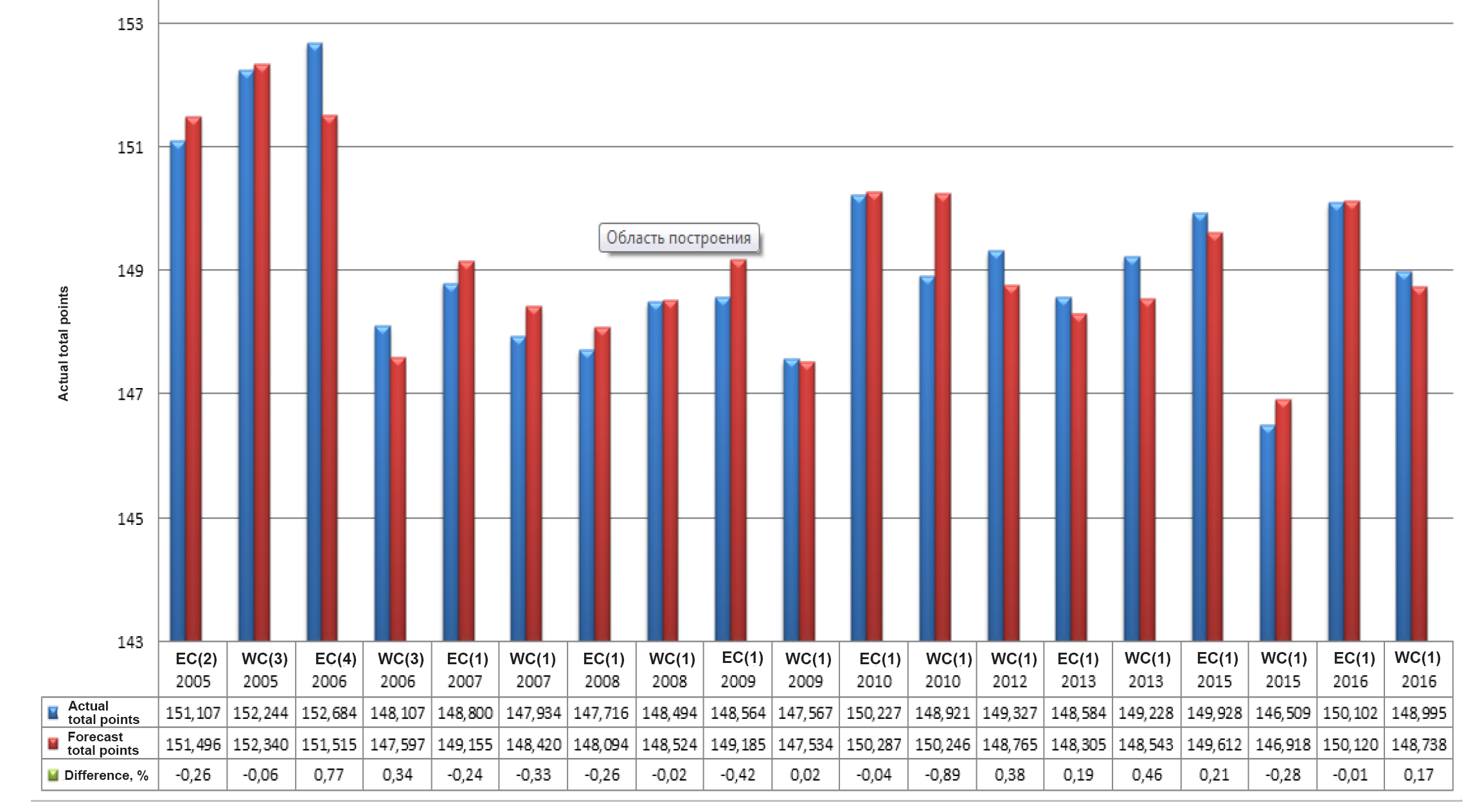All-round long track speed skating records of Sven Kramer: total points scoring in 500, 1500 and 5000 m events
Фотографии:
ˑ:
Honoured coach of Russia G.A. Polozkov1
Associate Professor, PhD, Honorary figure of physical culture of Russia
A.G. Polozkov2
1Moscow City Physical Culture and Sport Association of Moscow City Department for Physical Culture and Sport, Moscow
2Russian Customs Academy, Moscow
Keywords: Sven Kramer, all-round speed skating, cluster analysis, regression analysis.
Background. The all-round speed skating competitions summoned by the International Speed Skating Federation are ranked high among the most popular and interesting sport events. They are of high interest, among other things, in the technical, physical, functional, tactical and mental training aspects that are highly valuable for the theory and practices of the competitive skaters’ training process [1, 2, 3, 4].
It is a matter of common knowledge that competitive accomplishments in each of the four events of the all-round long track speed skating – that are largely determined by the technical and functional fitness of the skaters – show certain correlations [6, 7, 8, 9, 10]. Studies to find these correlations in the track records of the world top-ranking skaters are given a high priority by the modern skating sport theory and practice.
Objective of the study was to calculate and analyze the total points scored by Sven Kramer in the 500 m, 1500 m and 5000 m events of the long track all-round speed skating competitions.
Methods and structure of the study. Subject to the study were the sport accomplishments of Sven Kramer, three-times Olympic champion and eight-times World and European champion in the long track speed skating. Analyzed under the study were the Sven Kramer’s results in the 2005-16 World Championships (WC) and European Championships (EC) in long track speed skating. The study data were processed by statistical data processing tools based on cluster and regression analyses.
Study results and discussion. Subject to statistical analysis were the competitive accomplishments of Sven Kramer in the top-ranking long track speed skating competitions (see Table 1) with special references to the championship title, year and city, and the places won (in brackets).
Table 1. Sven Kramer’s competitive accomplishments in the 2005-16 World Championships (WC) and European Championships (EC)
|
|
Championship (place won) |
Year |
City |
500 m |
5000 m |
1500 m |
10000 m |
Total points |
|
1 |
European (2) |
2005 |
Heerenveen |
37,12 |
06:24,19 |
01:48,23 |
13:09,65 |
151,107 |
|
2 |
World (3) |
2005 |
Moscow |
37,19 |
06:27,27 |
01:49,28 |
13:18,03 |
152,244 |
|
3 |
European (4) |
2006 |
Hamar |
37,90 |
06:24,26 |
01:49,90 |
13:14,51 |
152,684 |
|
4 |
World (3) |
2006 |
Calgary |
36,93 |
06:09,97 |
01:46,80 |
12:51,60 |
148,107 |
|
5 |
European (1) |
2007 |
Collalbo |
36,76 |
06:15,65 |
01:44,86 |
13:10,44 |
148,800 |
|
6 |
World (1) |
2007 |
Heerenveen |
36,41 |
06:12,97 |
01:47,20 |
12:49,88 |
147,934 |
|
7 |
European (1) |
2008 |
Kolomna |
36,20 |
06:11,78 |
01:45,52 |
13:03,30 |
147,716 |
|
8 |
World (1) |
2008 |
Berlin |
36,22 |
06:13,35 |
01:46,46 |
13:09,06 |
148,494 |
|
9 |
European (1) |
2009 |
Heerenveen |
36,47 |
06:15,76 |
01:46,53 |
13:00,16 |
148,564 |
|
10 |
World (1) |
2009 |
Hamar |
36,33 |
06:09,74 |
01:45,01 |
13:05,21 |
147,567 |
|
11 |
European (1) |
2010 |
Hamar |
36,60 |
06:19,37 |
01:47,05 |
13:19,32 |
150,227 |
|
12 |
World (1) |
2010 |
Hamar |
36,45 |
06:19,63 |
01:46,83 |
12:57,97 |
148,921 |
|
13 |
World (1) |
2012 |
Moscow |
36,70 |
06:14,23 |
01:47,30 |
13:08,76 |
149,327 |
|
14 |
European (1) |
2013 |
Heerenveen |
36,70 |
06:12,55 |
01:47,49 |
12:55,98 |
148,584 |
|
15 |
World (1) |
2013 |
Hamar |
36,71 |
06:13,42 |
01:46,75 |
13:11,86 |
149,228 |
|
16 |
European (1) |
2015 |
Chelyabinsk |
37,03 |
06:17,32 |
01:47,41 |
13:07,27 |
149,928 |
|
17 |
World (1) |
2015 |
Calgary |
36,20 |
06:17,49 |
01:44,18 |
12:56,69 |
146,509 |
|
18 |
European (1) |
2016 |
Minsk |
36,56 |
06:19,17 |
01:48,08 |
13:11,98 |
150,102 |
|
19 |
World (1) |
2016 |
Berlin |
36,54 |
06:14,13 |
01:47,05 |
13:07,19 |
148,995 |
Note: excluded from the analysis was the result in the outdoor 2013 European Championship in Budapest
The competitive results were statistically processed using the applied software by B.G. Mirkin [5], with a special attention to the question of whether or not any regularity could be found in the total all-round points versus the points scored in every of the first three combined events. Such a linear correlation was found in the S. Kramer’s competitive data as described by the following regression equation (see Table 2 hereunder).
The regression equation is Y=T*a+b
Where Y- is the total score in the all-round events; a, b – the regression ratios; and Т – is the skater’s time in the event, seconds.
Table 2. Sven Kramer’s competitive data
|
|
Total score in the all-round events (Y) |
Time in the event, s |
Regression ratios |
|
|
|
a |
b |
||
|
1 |
Y |
Т 500 m |
3,19836 |
31,6835 |
|
2 |
Y |
Т 1500 m |
0,97043 |
45,43152 |
|
3 |
Y |
Т 5000 m |
0,274348 |
46,07717 |
A forecast of the S. Kramer’s total points in the all-round long track speed skating events based on his 500 m result using the regression equation #1 was published in 2009 [8]; and next time the similar forecast was published prior to the 2015 European Championship [10] in Chelyabinsk. Sven Kramer won the 2015 European Champion with the time of 37.03 s in the 500 m event and the total all-round score of 149.928 points. Let us calculate, for example, the all-round score using the equation #1:
Y (total points) =37.03*3.19836+31.6835
It makes up 150.119 points, and this forecast result was found only 0.13% different from the actual result in the competitions. It is known that S. Kramer normally scores the lowest points in the 500 m event, the first one in the combined events, as he takes only 7.42±3.9 place in this event as verified by the sample of 19 competitions. In this context we were interested to find contributions of other events to the final all-round score. Given in Figures 1-3 hereunder are the actual total points scored by the skater in the competitions versus the forecast total points (calculated using the regression equations), with the difference in percentage terms, World Championships (WC), European Championships (EC) and places won being indicated.

Figure 1. Actual points scored by Sven Kramer versus the forecast points, plus the difference rates (%) ПЕРЕВОД РИСУНКА

Figure 2. Actual points scored by Sven Kramer versus the forecast points, plus the difference rates (%) in the 1500 m events

Figure 3. Actual points scored by Sven Kramer versus the forecast points, plus the difference rates (%) in the 5000 m events
The correlation analysis of the 19 competitive data records of S. Kramer showed a strong correlation of the total all-round points and the points scored in the individual long track speed skating events, with the correlation ratios being the following: 500 m ratio = 0.84; 1500 m ratio = 0.88; and 5000 m ratio = 0.934. The ratios of the forecast all-round total points versus the actual all-round points scored were found to equal: 500 m ratio = 0.449±0.39; 1500m ratio = 0.373±0.34; and the 5000 m ratio = 0.281±0.24.
Having analyzed the study data, we concluded that comparisons of the actual total all-round points scored by S. Kramer with the forecast points scored separately in the 500 m, 1500 m and 5000 m events did not show any significant differences in the scores (p≤ 0.05). Therefore, the obtained regression equations may be applied to: forecast total points scored in the all-round events; make adjustments to the pre-season training process; and find new forms and tools for the special training systems.
The cluster analysis found a group of basically even skaters showing the actual 5000 m points being in a fair correlation with the forecast total points in the all-round events calculated by the equation #3. For instance, the track record data analysis in case of Enrico Fabris, two-times Olympic Champion and 2006 European All-round Champion in long track speed skating, with 7 EC and 5 WC track record data being taken into account, showed the points difference of 0.37±0.,2%. The similar analysis of the Bart Swings track record data in 4 WC and 3 EC gave the points difference of 0.196%.
Conclusion. The study demonstrated that the total all-round points scored by Sven Kramer in long track speed skating could be fairly forecast based on the actual points he scored in any of the first three distances of the combined events. The relevant multidimensional statistics methods may be applied to find individual correlations of the event results with the total all-round points scored in the long track speed skating competitions by either skater, conditional on his/her high motivation for the individual best accomplishment. Based on the regularities found by the study, a sport specialist may model special training tools and methods for elite skaters.
References
- Vasil'kovsky B.M. Kontrol' za urovnem spetsial'noy vynoslivosti i normirovaniem trenirovochnykh nagruzok v podgotovke konkobezhtsev-mnogobortsev vysokoy kvalifikatsii: dis. … kand. ped. nauk (Special endurance level control and standardization of training loads in elite all-round speed skating: PhD thesis) / B.M. Vasil'kovsky. – Мoscow, 1983. – 180 p.
- Vasil'kovskiy B.M. Prosto o slozhnom. Dialogi (Simple explanation of complex issues. Dialogues) / B.M. Vasil'kovskiy. – Almaty, 2009. – 136 p.
- Volkov N.I. Trenirovka silneyshikh kon'kobezhtsev mira (Training of the strongest skaters of the world) / N.I. Volkov, B.A. Stenin. – Мoscow: Fizkul'tura i sport, 1970. – 120 p.
- Mirkin, B.G. Analiz kachestvennykh priznakov i struktur (Analysis of qualitative characteristics and structures) / B.G. Mirkin. – Мoscow: Statistika, 1980, 1980. – 319 p.
- Mikhaylov V.V. Trenirovka kon'kobezhtsa-mnogobortsa (Training of skater-all-rounders) / V.V. Mikhaylov, G.M. Panov. – Moscow: Fizkul'tura i sport, 1975. – 230 p.
- O vzaimosvyazi i prognoze sportivnykh rezul'tatov na distantsiyakh klassicheskogo kon'kobezhnogo mnogobor'ya (na primere Enriko Fabrisa, chempiona Evropy i Olimpiyskikh igr). (On relationship and forecast of athletic performance at distances of classic speed skating all-around (case study of Enrico Fabris, European and Olympic champion). Sovremennye gumanitarnye issledovaniya. – 2010. – № 1. – P. 133-135.
- Polozkov A.G. Vzaimosvyaz' sportivnykh rezul'tatov na distantsiyakh klassicheskogo mnogobor'ya u muzhchin (Relationship of athletic performance at distances of men's classic all-around) / A.G. Polozkov, G.A. Polozkov // Teoriya i praktika fiz. kultury. – 2014. – № 11. – P. 69-71.
- Polozkov G.A. Ot Oskara Matisena do Nikolaya Gulyaeva (From Oscar Mathisen to Nikolay Gulyayev) // Kon'kobezhnyiy sport. – 2002. – № 9. – P. 18-20.
- Polozkov A.G. O prognozirovanii summy ochkov kon'kobezhnogo mnogobor'ya po rezul'tatu bega distantsii 500 metrov (na primere chempionov mira s 1928 po 1986 g.) (Forecasting total points in speed skating all-round by results in 500 m distance run (Case study of world champions from 1928 to 1986) / A.G. Polozkov, G.A. Polozkov // Voprosy gumanitarnykh nauk. – 2009. – № 3 (43). – P. 206-208.
- Polozkov A.G. Prognoz summyi ochkov konkobezhnogo mnogoborya Svena Kramera po rezultatu bega distantsii 500 metrov (Forecast of total points of Sven Kramer in all-round speed skating based on his 500 m result) / A.G. Polozkov, G.A. Polozkov // Pedagogicheskie nauki. – 2009. – № 6 (39). – P. 86-88.
Corresponding author: polozkoval34@mail.com



